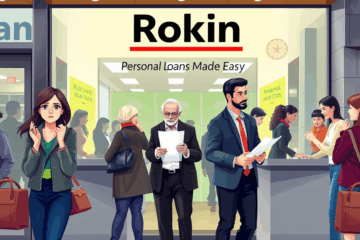Unlock Your Future with Property Guaranteed Loan
Property Guaranteed personal loans offer borrowers an innovative way to secure financing by leveraging real estate assets.
In this article, we will explore the various benefits associated with using property as collateral, including easier approval processes and competitive interest rates.
Additionally, we will examine how accessing larger loan amounts and potentially lowering monthly payments can enhance financial flexibility.
However, it is crucial to also consider the risks involved with secured personal loans, especially the consequences of defaulting on repayment.
By understanding these aspects, borrowers can make informed decisions regarding their financing options.
Concept and Key Features of Property‑Backed Personal Loans
A personal loan secured by property is a financing option where borrowers pledge real estate, such as a home or land, to obtain credit.
This type of loan is known as a secured personal loan because it uses tangible assets to guarantee repayment.
By using property as backing, the borrower assures the lender that if they default, the property can be claimed to recover the debt.
This asset-based security makes approval easier and typically offers more attractive interest rates compared to unsecured alternatives.
Property collateral reduces lender risk, which allows larger loan amounts and more flexible terms for borrowers.
According to Investopedia’s secured loan guide, these loans are commonly used when traditional credit isn’t sufficient to meet financial demands.
- Lower interest rates due to reduced lender risk
- Access to higher loan amounts
- Longer repayment terms tailored to needs
- Increased approval chances for borrowers with limited credit
Major Advantages for Borrowers
Using property as collateral to back a personal loan unlocks powerful financial advantages for borrowers seeking more flexibility and better conditions.
When you pledge a valuable asset like your home or land, lenders gain confidence in your ability to repay—which significantly increases your chances of loan approval even if your credit is less than perfect.
This level of security also empowers you to negotiate more favorable terms.
According to
News Loan Guide for Secured Loans”>U.S. News’ guide on secured loans
Offering real estate as collateral not only strengthens your application but also increases the lender’s trust, which leads to better financial outcomes
Borrowers benefit through:
- Higher loan limits
- Easier approval process
- Lower interest rates over time
These advantages result in more accessible funding, lower monthly payments, and greater control over financial planning
Secured vs. Unsecured Interest Rates
Secured personal loans, especially those backed by property like homes or land, usually offer significantly lower interest rates than unsecured loans.
This is because lenders face less risk when borrowers provide collateral.
With their risk minimized, lenders often provide broader borrowing limits and more competitive rate terms.
For borrowers with good credit and stable assets, secured loan rates can start around 6%, offering more accessible long-term financing.
In contrast, unsecured personal loans, which depend largely on credit scores and income, start with higher rates due to the lender’s increased exposure to default.
The table below illustrates the typical interest rate ranges for both types of loans:
| Loan Type | Typical Interest Rate Range |
|---|---|
| Secured (Property-Backed) | 6%–12% |
| Unsecured | 10%–24% |
| Primary Influencing Factor | Collateral and Credit Score |
Rates for unsecured loans are strongly influenced by creditworthiness and lender criteria.
According to Bankrate’s personal loan comparison guide, secured options are ideal if you seek better affordability and approval chances.
However, you should know that failing to repay a secured loan could lead to losing your property
Potential Risks and Consequences
When using property as collateral for a personal loan, borrowers face major financial risks that can escalate quickly if repayment obligations are not met.
The most severe of these is the Risk of foreclosure if you default, meaning your home or land may be legally seized and sold by the lender.
This could result in the complete loss of ownership and have long-term consequences on your housing stability and personal security.
According to insights from Investopedia’s foreclosure guide, lenders can initiate foreclosure proceedings once a borrower fails to meet the agreed payment terms, resulting in the forced sale of the property.
For those who default, this process not only removes their property but may also leave them with outstanding balances if the collateral’s value doesn’t cover the debt.
Beyond property loss, defaulting severely impacts your financial profile.
Borrowers will face a sharp decline in credit scores, which limits access to future credit opportunities including mortgages or credit cards.
Moreover, financial institutions may pursue legal actions to collect any remaining debt after collateral liquidation, leaving the borrower with wage garnishments or bank levies.
Seizing a property does not always satisfy the full loan balance, and debt collectors can pursue further action.
As explained by Mondaq’s analysis on default consequences, lenders may file lawsuits for deficiency judgments when the property’s sale value falls short.
To avoid such detrimental financial fallout, borrowers must prepare repayment strategies and fully understand their legal obligations before securing personal loans with valuable property.
Step‑by‑Step Approval Journey
The approval journey for a property-backed personal loan starts with gathering all necessary documentation.
Applicants must provide identification, proof of income, recent bank statements, and ownership documents of the proposed property.
Lenders use this information to verify financial capacity and ensure identity accuracy, as explained in the Bankrate guide on required loan documents.
This stage lays the foundation for underwriting and speeds up the next steps when done correctly.
After documentation is submitted, lenders arrange a property appraisal to estimate the market value of the collateral.
This is a critical checkpoint because the loan amount depends heavily on this valuation.
A certified appraiser visits the site, inspects the condition, and compares it to similar properties.
If the appraisal value aligns with the loan request, it significantly strengthens the borrower’s case.
Lenders will not move forward without this essential confirmation of asset value.
Following appraisal completion, the loan enters credit evaluation.
Lenders conduct credit checks and assess debt-to-income ratios, often referencing credit reports and past payment behaviors.
Using tools explained in Inscribe’s guide to loan underwriting, underwriters analyze the borrower’s capability to make regular payments.
Once risks are measured and the collateral confirmed, the loan moves to final approval.
The lender makes a decision based on the full package—property appraisal, documentation and creditworthiness working together to secure the loan approval.
Common Use Cases and Ideal Borrowers
A personal loan with property guarantee often serves as a practical solution for borrowers who need access to larger loan amounts with more favorable interest rates.
By leveraging a property asset as collateral, individuals unlock financial resources for significant goals like a home renovation project, where the cost of labor and materials can escalate quickly, or a debt consolidation plan that merges multiple high-interest accounts into a single, more manageable payment.
In some situations, entrepreneurs seeking capital for business expansion find these secured loans more accessible and cost-effective compared to traditional commercial lending.
Unlike unsecured alternatives which typically offer lower limits and higher rates, secured personal loans can extend longer repayment terms and reduced monthly payments.
According to LendingTree’s guide to collateral loans, this option is especially well-suited for borrowers with significant equity, steady income, and a strong credit history, all of which boost approval chances and improve loan conditions.
In conclusion, Property Guaranteed loans present notable advantages for borrowers seeking financial support.
While they offer greater access to funds and improved terms, it is vital to remain aware of the risks associated with these loans and the potential repercussions of non-repayment.



0 Comments